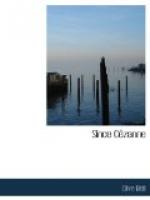And, indeed, there are autumnal indications: the gay papier-mache pagoda is beginning to lose its colours: visibly it is wilting. When, a few days after the conversation I have recorded, it was rumoured in Paris that the admired Prokofieff, composer of Chout, had said that he detested ragtime, the consternation into which were thrown some fashionable bars and salons was as painful to behold as must have been that into which were thrown parlours and vicarage gardens when Professor Huxley began pouring cold water on Noah’s Ark. We hurried away to the Southern Syncopated Orchestra, only to find it sadly fallen off. But had it really changed so much as we? And, more and more, immense musical and literary activity notwithstanding, people are looking to the painters, with their high seriousness, professionalism, conscience, reverence, and vitality as the sole exponents and saviours of “le grand art.” Not for nothing is Derain the most admired of Frenchmen by the young elite; for Derain is humorous without being gavroche, respects the tradition yet is subservient to no school, and believes that all the highest human faculties are not more than sufficient to the production of the smallest work of art.
What the pick of the new generation in France, and in England too, I fancy, is beginning to feel is that art, though it need never be solemn, must always be serious; that it is a matter of profound emotion and of intense and passionate thought; and that these things are rarely found in dancing-palaces and hotel lounges. Even to understand art a man must make a great intellectual effort. One thing is not as good as another; so artists and amateurs must learn to choose. No easy matter that: discrimination of this sort being something altogether different from telling a Manhattan from a Martini. To select as an artist or discriminate as a critic are needed feeling and intellect and—most distressing of all—study. However, unless I mistake, the effort will be made. The age of easy acceptance of the first thing that comes is closing. Thought rather than spirits is required, quality rather than colour, knowledge rather than irreticence, intellect rather than singularity, wit rather than romps, precision rather than surprise, dignity rather than impudence, and lucidity above all things: plus de Jazz. Meanwhile, whether the ladies and gentlemen in the restaurants will soon be preferring sentimental waltz-tunes to flippant ragtimes is a question on which I cannot pretend to an opinion. Neither does it matter. What these people like or dislike has nothing to do with art. That is the discovery.



